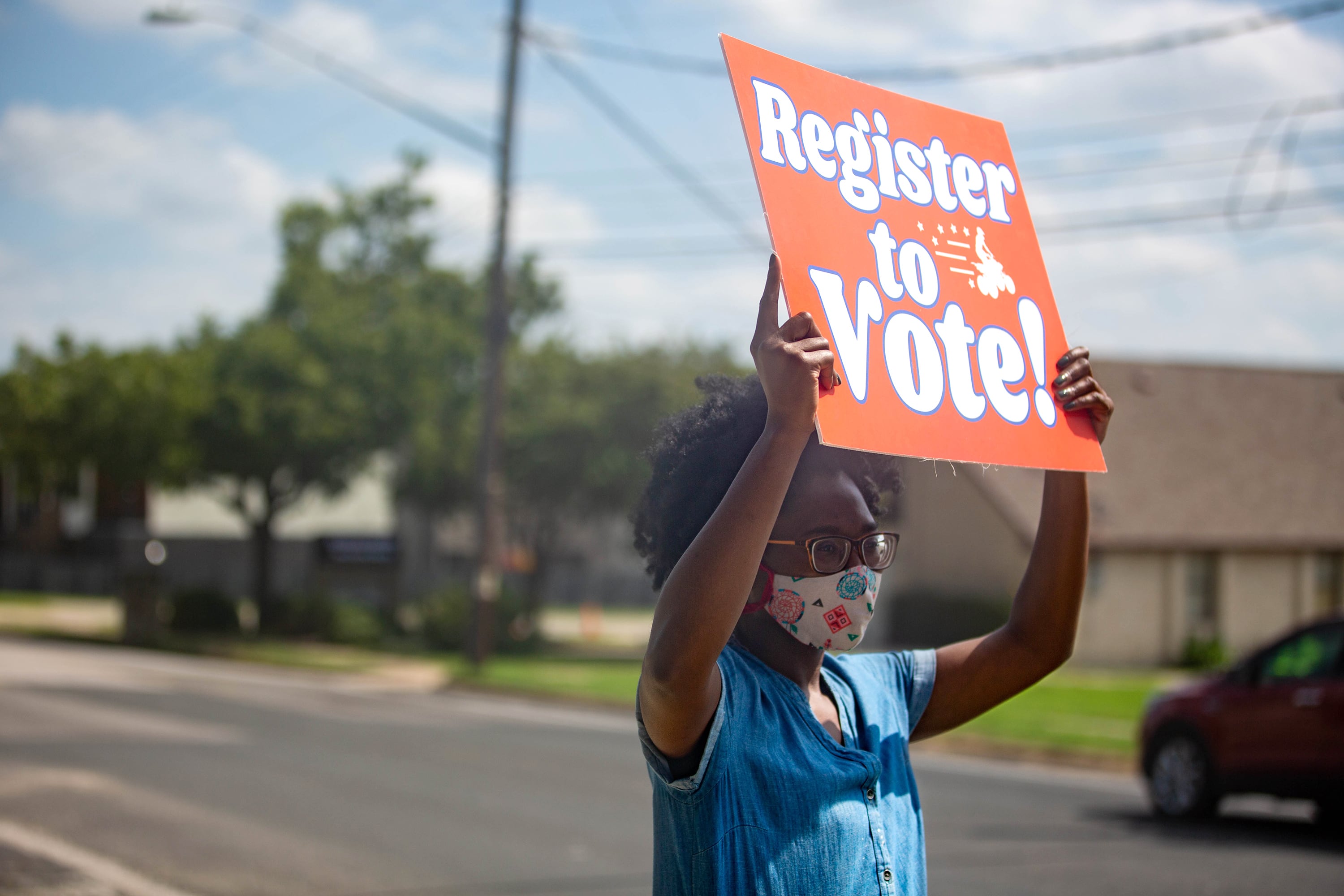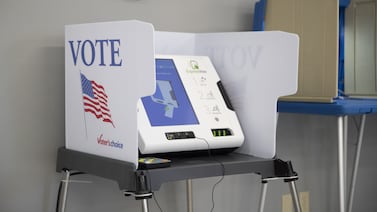Votebeat is a nonprofit news organization reporting on voting access and election administration across the U.S.
With some Texas Republicans pushing the state to abandon one its best tools for preventing voter fraud — a coalition of states that share voting roll data to weed out duplicate and suspicious registrations — the secretary of state’s office is trying to discern if it can build a replacement.
But the effort could easily stall or take years, experts say. Similar efforts in other states over the past two decades have not worked, or have been shut down, because they lacked bipartisan support from multiple states and access to the kind of national data that produces accurate cross-state voter list matching — all of which the Electronic Information Registration Center, or ERIC,spent years developing.
The push to have Texas become the latest state to withdraw from ERIC, a long-standing effort by nearly 30 states, is rooted in a yearlong misinformation campaign that spread through right-wing media platforms and advocacy groups.
If the state decides to leave the program but fails to produce a similar tool, Texas’ voter rolls will inevitably be less accurate, which could fuel claims of voter fraud, experts say. That could increase costs for counties who’d be more likely to send election mailers to voters who have moved out of state or died, because outdated information would linger on the voter rolls. And the state, too, would spend more than it would save by leaving the program because it would need to build the technical infrastructure and meet the federal security requirements needed to protect sensitive data in order to make an alternative viable.
Sam Taylor, a spokesperson for the Texas secretary of state’s office, declined to comment on the feasibility of developing a new alternative to ERIC. He told Votebeat, however, that at least Georgia and Nevada — states that are currently members of ERIC and supportive of the program — and Oklahoma have expressed interest in working with Texas on the project. Taylor said research is also underway on the cost of developing such a system.
In no small part, experts note, the coalition ERIC built over many years worked, because member states — led by both Democrats and Republicans — agreed to come together in a good-faith effort to share the necessary data and information to help maintain voter rolls across state lines. But in recent months, political pressure on Republican-led states has put the coalition at risk. Last year, Louisiana, then Alabama, followed by Florida, West Virginia, Missouri, and most recently Ohio and Iowa, announced they would depart. Texas could be next: The Texas Legislature is already considering various bills to leave ERIC.
And the state’s attempt at replacing the program both would not be an efficient solution and could have implications for the states that remain in ERIC by making it harder for states to join together across party lines, said Marc Meredith, an assistant professor of political science at the University of Pennsylvania and an expert on election administration. Meredith has also done research on voter list maintenance.
“It would be incredibly disappointing to end up with basically two versions of the same thing because the value of data grows exponentially as you can make more and more comparisons between states,” he said, and added that by leaving the program, Texas will deprive itself of all the other states’ data while preventing the other states from obtaining data on more than 16 million registered voters in the state. “It’s not like if you split the world and have 25 states in one [program] and 25 states in another, [it] would be equally good. It’s actually more than double the bad.”
Creating an ERIC alternative would be expensive and difficult
The secretary of state’s office announced this month that it removed its longtime elections director, Keith Ingram, from his position and directed him to create and manage Texas’ own “interstate voter registration crosscheck program.” Christina Adkins, the office’s legal director, became the state’s acting elections director.
The abrupt announcement of Ingram’s new task came on the tail of a push by members of the Texas GOP, including lawmakers, to get out of ERIC. Recent objections in other states have centered on concerns about how the program is run and data privacy.
Ingram himself, who was Texas’ representative on the ERIC board and one of the state election officials who run the program, has defended it. He last year addressed the false claims and told the group of Republicans that no alternatives to ERIC existed. Nevertheless, the GOP created a task force to get Texas out of ERIC and added it to the party’s legislative priorities. Republican legislators who were involved in the effort from the start filed bills this session in the House and Senate to get it done.
Texas’ current law requires the state to participate in a multistate information sharing program to clean its voter rolls. Experts say there is no equivalent alternative to ERIC right now, though some private firms are attempting to sell their services to compete with it; those likely won’t be as effective or accurate without the access to data that only state officials can obtain.
ERIC launched in 2012 after a bipartisan coalition of state and local election officials came together to brainstorm a more efficient and cost-effective way to clean the voter rolls and identify voters across state lines who have moved or died. The goal was also to get eligible but unregistered voters on the rolls by notifying them well ahead of busy election cycles, when counties would have to spend more resources registering new voters on deadline. The coalition began with seven states and grew to more than 30 by 2022. There has been no evidence of irregularities or security breaches since its founding.
The program is successful because state election officials, who run the program and serve as its board members — Adkins now represents Texas — have to agree on rules and regulations to provide and receive access to data, including security protocols governing how that data is shared. Some state legislatures also have to pass laws to allow their participation in the program in order to allocate funding and to set provisions about who can and cannot legally access such data. All of this happened over many years.
As the program matured, it also obtained certification from the U.S. Postal Service, which helps ERIC validate and verify voters’ address changes. It also solidified a relationship with the federal agencies that provide other information to ensure accurate matches, such as Social Security death data. These yearslong developments enabled ERIC to achieve a level of sophistication that would be difficult for an alternative program.
“In theory, someone could try to stand up a copycat of ERIC,” said Michael Morse, a political scientist and fellow at the University of Chicago Law School who has done research with Meredith about voting list maintenance systems. Most recently, Morse’s research focused on ERIC. “But to me, it is highly unlikely that anyone could meet all the necessary privacy and security requirements for confidential data to actually get it done, in addition to any necessary state legislative authorization.”
Non-ERIC member states would also require funding to set up the technical infrastructure needed to protect the data, maintain subscriptions to national databases and meet costly federal data-handling requirements, which could amount to hundreds of thousands of dollars a year. Texas currently pays about $115,000 for its yearly ERIC dues. It also budgets more than $1 million on mailing, postage and printing costs associated with inviting eligible voters to register, something required under the ERIC membership agreement that several states are now attempting to change.
Since ERIC is run by its member states, it has access to motor vehicle data, which no one other than state and federal agencies can access. Having that information is key for accurate cross-state voter roll maintenance, and another reason why ERIC is so effective and difficult to replicate, Morse said.
Previous efforts have failed because state voter registration lists alone generally don’t have enough unique information to distinguish individuals across the country. A lot of people share the same first name, last name and date of birth. ERIC uses confidential motor vehicle department records that allow the program to recover partial Social Security numbers for voter registrations that don’t have that information, supplementing it.
This makes ERIC a much more accurate tool than, say, the now-defunct Crosscheck, a precursor program created by Kansas, because it provides more unique data about each voter, improving the accuracy of matches across data sets, Morse said.
In 2013, the early days of ERIC, Joe Gloria was the registrar of voters in Clark County, home to Las Vegas. He was one of the first election officials who used ERIC as a tool to clean voter rolls, something that took a lot of work and resources in his famously transient jurisdiction, said Gloria, now the executive officer of operations for the National Association of Election Officials. As ERIC matured and more states joined, especially those neighboring Nevada, such as Arizona, Utah and Oregon, Clark County started seeing more benefits.
For example, the county spent less on sending election mailers to in-state inactive voters, or to voters who had moved out of state or died. “It cost approximately $1.25 for every mailer that we sent. That doesn’t sound like a lot, but when you multiply it by more than 70,000 people, that’s a great cost to the constituents in Clark County,” Gloria said.
The voter rolls are public, so anyone can request or inspect them. Activists who do their own data matching work in an effort to police for potential voter fraud could find misleading indications of wrongdoing if the voter rolls include murky or outdated data, experts say. Clean rolls are “good for the integrity of the election process,” Gloria said.
Past efforts to cross-check voter rolls without ERIC have failed
Before ERIC was established, 30 states used the Kansas-based Crosscheck program, created in 2005 by former Kansas Secretary of State Kris Kobach, which let states compare their voter rolls at no cost. But it lacked data security measures and the expansive national databases — and motor vehicle data — needed to provide accurate results.
By 2017, Crosscheck data matching was under fire as unreliable because it used only publicly available information such as names, dates of birth — which many people share — and voting history. States began to leave the program, and lawsuits over data breaches and vulnerabilities forced it to shut down.
Instead, states joined ERIC. But years before the most recent conspiracy theories about ERIC went viral, one state opposed using it and tried to go its own route. Indiana’s failed attempt to create an alternative program for voter roll matching foreshadows the challenges that lie ahead for Texas.
In 2017, voting rights groups sued Indiana for enacting a law that allowed the state to use Crosscheck data to remove voters from the voter rolls without notifying them first, which a judge ruled was a violation of federal voting rights law. The judge also blocked use of Crosscheck in Indiana after the voting rights groups argued the program was too unreliable to use it to remove voters from the rolls.
As a result, Indiana lawmakers in 2020 passed an election law that not only prohibited Indiana from using Crosscheck but from joining any program like it, including ERIC.
Some Indiana lawmakers at the time opposed joining ERIC because of data sharing security concerns. In addition, they said the program was too costly, and they had concerns about ERIC’s early connections to the Pew Charitable Trust, a nonpartisan think tank that helped seed ERIC’s creation before it was taken over by its member states.
“ERIC was somehow bad because some people here characterized Pew as this ultraliberal foundation funding all of this ultraliberal and crazy stuff,” said Julia Vaughn, executive director of Common Cause Indiana. The organization was a plaintiff in the lawsuit against the state in 2017.
The law prohibits Indiana from joining a system that requires a payment to obtain voter registration information from another state or that requires funds to “engage in activities other than list maintenance” as a condition for receiving voter registration data from other states. ERIC requires its member states to send notifications to eligible but unregistered voters explaining how they can sign up.
The law also allowed the Indiana secretary of state to build the state’s own version of Crosscheck, using only information publicly found on voter registration lists, such as first and last names and dates of birth, which have been proven to produce unreliable matches. The law, again, allows counties to immediately remove people from the rolls identified by its program, dubbed IDEA, which stands for Indiana Data Enhancement Association. But that program was never fully developed. Instead, it was blocked by a judge who reaffirmed the 2017 ruling that had found such matches would be unreliable.
That leaves Indiana with neither its own cross-state voter data sharing program nor the ability to join ERIC.
“[IDEA] was a political stunt. And our voter rolls continue to need attention,” Vaughn said. “We gave up on trying to convince [Indiana state officials] to join ERIC a long time ago. They proactively said, ‘We don’t want anything to do with this.’ And we’ve got other fights to take on here. And now nobody’s paying attention to the issue.”
The Indiana secretary of state’s office and the bill’s author, state Sen. Greg Walker, declined to comment.
A cautionary tale
Texas, like Indiana, could be forced to withdraw from ERIC before a viable alternative is in place if pending legislation passes.
Two bills, one by state Sen. Bob Hall and another by state Rep. Steve Toth, both Republicans, would specifically prohibit the state from using ERIC.
State Sen. Bryan Hughes’ bill would require the secretary of state to stop using ERIC if it can find a “private sector data” alternative with a price cap of $100,000 that could identify voters who have been convicted of a felony. Some voter fraud activists in Texas have suggested the state use a program dubbed Omega4America, initially funded by MyPillow CEO Mike Lindell, who is known for spreading election conspiracy theories. The program’s creator, Jay Valentine, has been doing presentations about the program in people’s backyards.
According to a letter posted on the Omega4America website, Valentine claims he has examined voter rolls in more than 30 states and that “ERIC is failing to clean voter rolls, and the number of fake people and fake addresses in the voter rolls is large enough to change election outcomes in every state we examined.”
Meredith said Omega4America is promoting faster computing, but if it doesn’t have access to motor vehicle department data, much like Crosscheck, its results won’t be reliable.
The bill by Hughes would also prevent the secretary of state’s office from sharing information that isn’t found in voter registration lists. Morse said it’s unclear whether Hughes’ bill means that Texas will only be allowed to share information that’s already publicly available or if it’ll be allowed to also share motor vehicle data, which is what results in the most accurate cross-state matches. Hughes did not respond to Votebeat’s request for clarification.
“This would authorize the secretary of state to leave ERIC potentially for a solution that seems set up to fail,” Morse said.
Voter fraud activists in Texas have for years claimed fraud due to dirty voter rolls, even though there’s no evidence to support those claims. They have proactively requested copies of the voter registration lists, which are public, from county election offices, and have used them to challenge the legitimacy of voters. Over the past year, some of these activist groups have knocked on people’s doors across Texas counties to verify voters’ addresses and sent postcards attempting the same.
The voter registration system is tied to residential addresses, and every day, everywhere in the country, people move and change their address. That means our voter rolls are constantly out of date, but that does not necessarily lead to fraud, Morse said.
To now say that ERIC doesn’t work, and to instead use alternatives created by “vigilante list maintenance groups” that operate much like Crosscheck, with publicly available but incomplete data, “is all but designed to promote the narrative of fraud,” Morse said. “Because it’s not reliable enough.”
Natalia Contreras covers election administration and voting access in Texas for Votebeat in partnership with the Texas Tribune. Contact Natalia at ncontreras@votebeat.org






